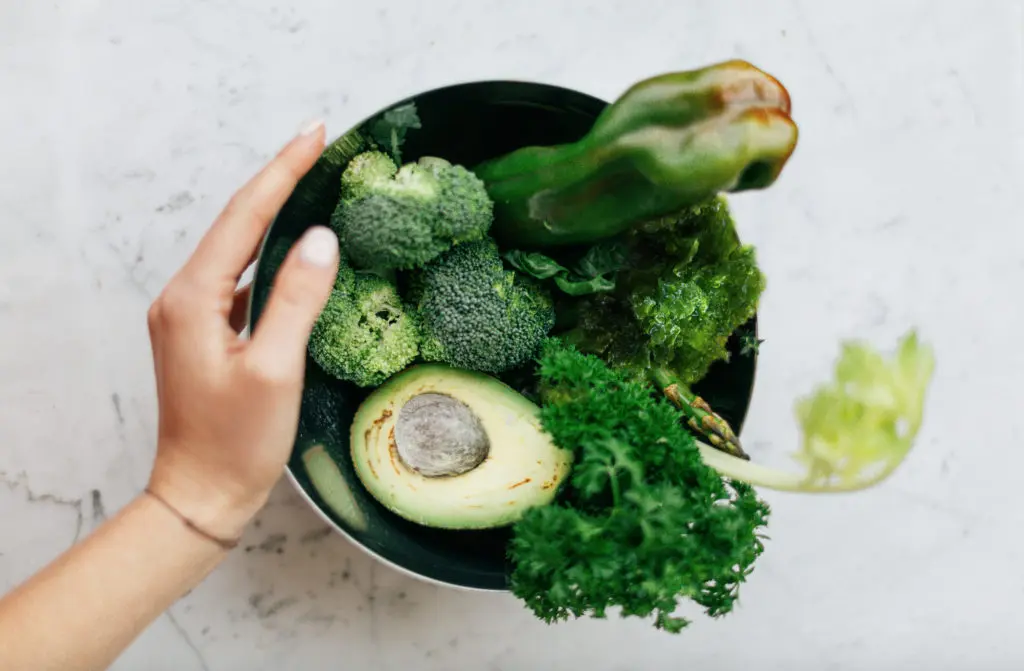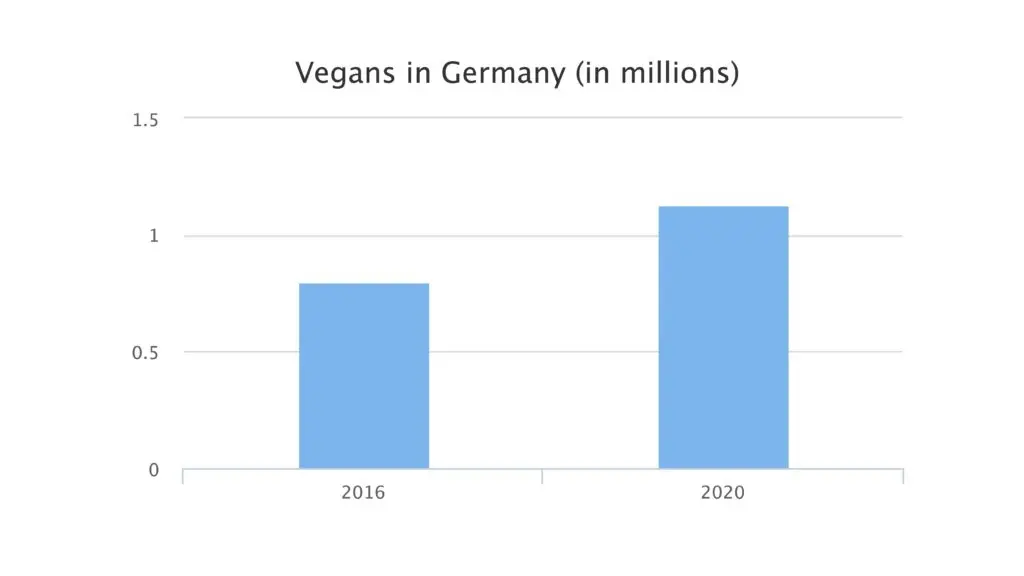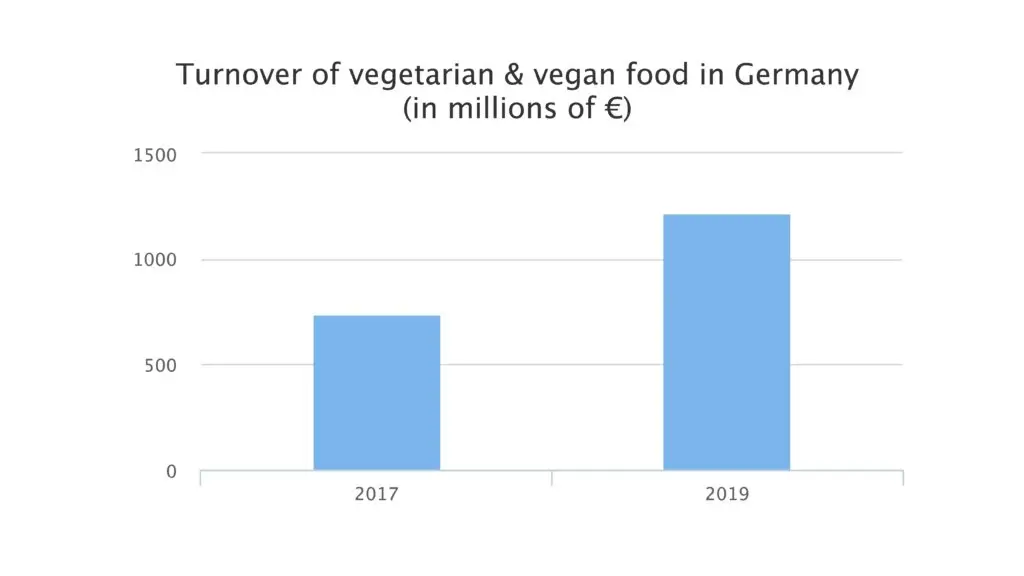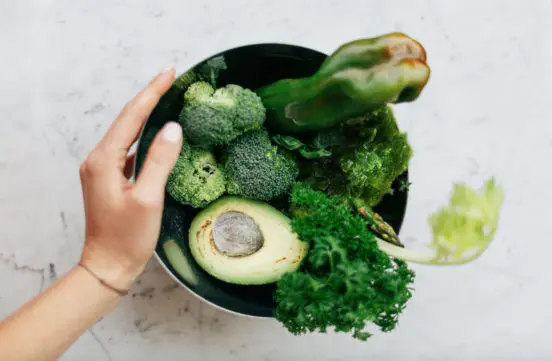
Overview of the vegan diet trend
Vegan nutrition is nowadays probably a term known to everyone. The term, which was coined by Donald Watson, has been around for a little less than 80 years and stands for a purely plant-based diet. Unlike vegetarianism, animal products such as milk and eggs are also avoided, and not just meat consumption.
The number of humans, who maintain a vegan diet, grows constantly. According to surveys by the „Instituts für Demoskopie Allensbach”, the number of vegans in Germany rose by around 41.25% between 2016 and 2020.

With the growing number of vegans, the demand for vegan products that do not contain any animal ingredients is also growing. This is also reflected in the sales of vegetarian and vegan products. Thus, according to a study conducted by Nielsen, turnover increased by 65.62% from 2017 to 2019.

There is a clear upward trend in vegan and vegetarian alternatives to meat and animal products, which is encouraging in light of climate change and the impact of the meat industry with regard to greenhouse gas emissions.
The vegan diet also has many health benefits, but it is sometimes difficult to find plant-based alternative sources for certain nutrients. These nutrients are largely found in animal products almost exclusively and can lead to deficiencies that have a negative impact on health.
This is where algae come into play, as they offer many attractive sources of these nutrients that terrestrial plants can only provide in small quantities. In the following section, we will explain in more detail what nutrients we are referring to, what their role is in the body, and which algae can provide these nutrients.
What nutrients can be provided by algae to support a vegan diet?
As mentioned above, the vegan diet is fundamentally very good, and offers a number of health and environmental benefits, such as:
- richer in various nutrients
- lower risk of heart diseases
- lower blood sugar
- smaller ecological footprint
(You can read more about this in the resources under “Health benefits” and “Impact on ecological footprint”).
The vegan diet thus holds many benefits for us humans, but also for the environment and future generations. It is therefore both advisable and necessary to promote it further, and to look specifically for alternatives in those areas where it is difficult to find plant-based alternatives.
Below you will get an overview of these nutrients, which often lead to deficiencies. They will then be explained more specifically in the following sections.
Nutrients which are difficult to obtain from plants:
- Vitamin B12
- Omega-3 Fatty Acids
- Iron
- Zinc
- Calcium
- Iodine
Vitamin B12
Vitamin B12 has some very important tasks in the body. Among other things, it influences cell division and differentiation, which in turn is important in the maturation and formation of red blood cells. It also influences the formation of nerve cells in the spinal cord and plays a role in many reactions in nucleic acid and protein metabolism.
Probably the richest source of Vitamin B12 is found mainly in animal products such as meat, fish, seafood, eggs and dairy products. The reason for this is that the compounds, which are summarized as Vitamin B12, are only produced by bacteria and blue-green algae. These blue-green algae and bacteria are absorbed through the food of animals and then accumulate in said animals so that Vitamin B12 is found mainly in animal derived products.
Recommended daily dose
- 1-7 years: 1.5-2.5 µg per day
- 7-13 years: 2.5-3.5 µg per day
- Adolescents and adults: 4.0 µg per day
- Pregnant women: 4.5-5.5 µg per day
Seaweed such as Nori (38mg/100g*) and blue-green algae in themselves, such as Spirulina, can help support the Vitamin B12 balance in the body on a vegan diet. However, they can only play a helping role, and not completely replace supplementation. Nori, for example, is suitable for formulating soup recipes, while Spirulina is excellent for vegetable smoothies.
Omega-3 Fatty Acids
Polyunsaturated fatty acids, which include the Omega-3 fatty acids DHA, EPA and ALA, play an essential role in the maintenance of the outer layer of our cells, and thus form a key part of the construction of the cell membrane.
Omega-3 fatty acids are known as the healthy fats found in fish such as salmon, as well as plant sources such as flax oil. However, fish forms the main source of it, and is therefore difficult to access on a vegan diet.
In our blog “Alternative DHA and EPA Sources from Microalgae“, we explain specifically what important functions Omega-3 fatty acids perform in our bodies, and why microalgae offer an ideal plant-based alternative to fish.
Omega-3 from algae is particularly interesting, for instance, in the production of baby food, as the unsaturated fatty acids are very important for the healthy development of infants and young children. Of course, they are also an essential part of a healthy and balanced diet for adolescents and adults.
Iron
Iron plays an important role in our body, it enables the transport of oxygen, which is essential for survival. Thanks to Iron, the oxygen that is absorbed through the lungs can bind to the red blood cells and be transported through the body and used for energy production.
The most efficient source of Iron are meat products, because it is essential for life in animals, just as it is for us humans, and is therefore more concentrated in them than in plants.
Recommended daily dose
- Adults: 10 to 15 mg per day
- Children: 8 to 10 mg per day
For example, the seaweed Ulva rigida (100mg/100g*) is a good ingredient for salad mixes, as the name “sea salad” already suggests.
Zinc
Zinc has an impact on several important functions in our body. For example, it contributes to the growth of cells and helps in wound healing. But also our immune system benefits from Zinc, and is supported by it. It is particularly important to take in Zinc on a regular basis through food, as the body can only store it in small amounts.
The most important supplier of the trace element Zinc is meat, especially beef, pork and poultry. Zinc is also found in plants, but its absorption by the body is often hampered by the substance Phytate. Phytate is needed by plants for photosynthesis and binds the Zinc in the human body, which makes it less efficiently absorbed by the body than it is the case with meat.
Recommended daily dose
- Children 0-1 year: 1.5-3 mg per day
- Children 3-9 years: 3-6 mg per day
- Children 10-14 years: 9-12 mg per day
- Adolescents: 14 mg per day
- Adults: 1-16 mg per day (depending on phytate intake)
Fucus vesiculosus (13.1mg/100g*) also known as Bladderwrack is a seaweed which is suitable for use in pasta and soup recipes. But also, for more unusual product developments, such as a vegetable quiche, this seaweed can contribute as an additional Zinc supplier.
Calcium
Almost everyone has heard at some point in their life that Calcium makes bones strong, this is not told for without reason. Calcium is considerably accountable for the formation, growth as well as the new formation of bones and teeth. But it also contributes to the stabilization of cell walls and contributes, among other things, to blood coagulation.
Calcium is the most abundant mineral in the body, around 1-1.5 kg is present in the body of an average adult. Most of it is found in the bones and teeth.
The main source of calcium are dairy products, but the mineral is also found in hard drinking water and various vegetables.
Recommended daily dose
- 10-12 years: 1100 mg per day
- 13-18 years: 1200 mg per day
- Adults: 1000 mg per day
Lithothamnium calcareum powder is not an algae per se, but as the name “calcareum” suggests, it has a very high calcium content. Its neutral to slightly algal taste makes it well suited as an additive to enhance the calcium content of recipes without affecting the taste too much.
Iodine
The essential trace element Iodine is important for the formation of thyroid hormones, which are needed for the regulation of the metabolism. It also influences the function of the nervous system and plays a role in cognitive abilities. In addition, it influences the energy metabolism of our body.
The main sources of Iodine are sea fish and sea animals, as well as dairy products. But also, spinach can have a high content of Iodine, but the Iodine content of vegetables is strongly dependent on the region, because different regions have soils that are richer or poorer in Iodine than others. In seawater, on the other hand, there is always plenty of Iodine, which in turn has a positive effect on the Iodine content of algae.
Recommended daily dose
- Infants (7th to 11th month): 70 micrograms per day
- 1-14 years: 90 to 120 micrograms per day
- Adolescents and adults: 130 to 150 micrograms per day
All seaweeds have a more or less high concentration of Iodine. This makes them ideal for a wide variety of product developments. Since seaweeds can vary in taste from sweet to salty to umami and peppery, they can be well integrated into any kind of food related product development.
Algae as helpful assistants in vegan product development
The vegan diet offers many advantages, and above all is a definite step in the right direction concerning climate neutrality as well as an ethical diet. Moreover, the trend cannot be ignored that more and more people are interested in living this lifestyle.
Algae can play a key role as space on Earth is limited and the world’s population is growing steadily. The oceans offer many opportunities to provide environmentally conscious alternatives to meet the growing demand for food and essential nutrients without depleting the oceans.
At Alganex, we hope to make the world a better and more sustainable place with our services, and help you develop products for this growing and forward-thinking market.
We are happy to help you develop new vegan products.
*All ingredient quantities are based on the analytical values of our algae. These should not be taken as standard values, as algae are natural products, and their ingredients may vary depending on location and season.
Sources & References:
Origin of the word „vegan“:
https://www.dictionary.com/e/veganism/
Statistics:
https://de.statista.com/statistik/daten/studie/173636/umfrage/lebenseinstellung-anzahl-vegetarier/
Impact on ecological footprint:
Health benefits:
https://www.healthline.com/nutrition/vegan-diet-benefits#TOC_TITLE_HDR_4
Problems of a vegan diet:
https://www.nzz.ch/wissenschaft/wie-gesund-ist-vegane-ernaehrung-ld.1588448
B12 Information:
https://www.netdoktor.de/ernaehrung/vitamin-b12/
B12 in Nori:
https://www.ncbi.nlm.nih.gov/pmc/articles/PMC4042564/
Eisen Information:
https://www.apotheken-umschau.de/laborwerte/eisen
Iron daily dose:
https://www.bfr.bund.de/cd/28366
Zinc Information and daily dose:
https://www.netdoktor.de/ernaehrung/zink/
Zinc in Fucus vesiculosus:
https://pubmed.ncbi.nlm.nih.gov/15111037/
Calcium Information:
https://www.gesundheit.de/ernaehrung/naehrstoffe/mineralstoffe-und-spurenelemente/kalzium
Calcium daily dose:
https://www.dge.de/wissenschaft/weitere-publikationen/faqs/calcium/
Iodine Information:
https://www.eucell.de/ernaehrung/ernaehrungslexikon/spurenelemente/jod/wirkung.html
Iodine daily dose:







Comments by Pit Wagner